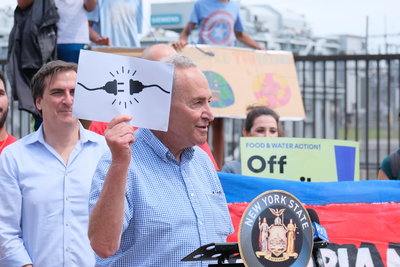Lawmakers led by Chuck Schumer rallied alongside environmental activists on July 9 in front of a power plant in Astoria to protest the proposal of a new fracked gas plant being built in the neighborhood by the Texas-based energy company NRG.
The event featured an array of speakers from the federal level down to the city level, who vocalized concerns that the peaker plant would undermine the Climate Leadership and Community Protection Act, a state law enacted in 2019 that aims to reduce New York’s carbon pollution.
“We do not need and cannot afford – with the existential threat to our planet – anymore coal, oil or gas being burnt and sending poisonous carbon into our atmosphere,” said Senator Schumer. “I will be using all the muscle I can and my persuasive powers to get them to stop this plant.”
New York’s Department of Environmental Conservation recently opened a public comment period into the proposed overhaul of the 50-year-old power generators that have given its surrounding area the nickname “Asthma Alley.” People calling out against the renovation asked residents throughout western Queens and New York to contact the DEC and submit comments before August 29.
“The only people that want to build fossil fuel plants now are the people that make money from building fossil fuel plants,” said New York State Senator and Deputy Majority Leader Michael Gianaris, who represents western Queens and pointed out how Black and brown communities have been plagued by the power plants.
Opponents of the project argued that residents have had to put up with power plants that emit dirt, soot, and poisons into the atmosphere for too long. Gianaris said, “For the sake of not just the city, the state, but the entire country and the world, we need to stop fossil fuel production and replace it with renewables.”
The joint display of opposition towards the new fracked gas plant was backed by progressives from the national level and the local level, including Congresswoman Alexandria Ocasio Cortez – who was unable to attend the event – and Tiffany Cabán, who is slated to represent the city’s 22nd Council District after a convincing victory in Astoria.
“We produce about half of the power generated around the city, and we’re paying for that power times two,” said Cabán, who grew up in Astoria and talked about how air pollution was among voters’ top concerns in the area. “The status quo is literally killing us, and it’s also disproportionately harming Black and brown, working class communities.”
While running for City Council she was endorsed by the Democratic Socialists of America, who also had a handful of members present at the protest. They advocated for a publicly owned power grid that they believe would empower communities in shifting towards renewable energy and decried an “economic system that rewards profits, that rewards burning fossil fuels, over the lives of the people in this country,” as one member put it.
Local lawmakers have already begun to envision what energy infrastructure could look like in the near future for western Queens. This past February the City Council passed the “Renewable Rikers” Act, which approved a feasibility study to determine whether different types of renewable energy sources like solar and wind, combined with battery storage, are feasible on Rikers Island.
“When we reject outdated, polluting infrastructure, we open so many doors,” Cabán said, who believes Renewable Rikers would help address the area’s interconnected disparities in racial and environmental justice. “Rejecting projects like this is the first step to an economic recovery for our communities to build out and maintain new infrastructure that’s going to serve us for generations to come.”
Ramon Cruz is president of the Sierra Club, one of the nation’s largest environmental conservation groups. Cruz blasted NRG’s proposal at the protest, explaining that there is no way it could comply with the CLCPA’s carbon-emissions mandate. He said, “The Sierra Club categorically opposes permitting these new plans, because it does not comply with [the] mandate and because it sits in a community with some of the highest asthma rates in the city.”
NRG pushed back, stating that the proposal is fully consistent with the CLCPA because it results in large reductions in statewide greenhouse gas emissions – the equivalent of taking more than 94,000 cars off the road each year. They also said that the plant will be fully convertible to green hydrogen in the future but did not provide a timeline of when the changes could be made.
Shawna Morlock lives in “Asthma Alley” and is also a member of the DSA. Living only six blocks away from a power plant in Queens, she’s not only concerned for the health of her neighbors but for that of her seven-year-old child as well. She’s hopeful that the condemnation of NRG’s proposal will serve as a role model for other politicians across the nation. She said, “We need to set the example of not letting fossil fuel companies buy off our politicians because that’s exactly what’s happening here.”



